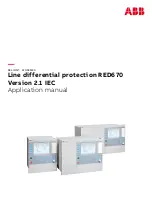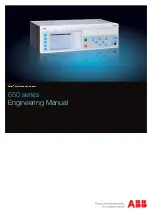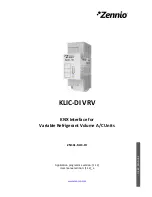
1MAC052634-MB D
Section 3
Vendor-specific implementation
615/620 series ANSI
17
Communication Protocol Manual
Change events and time synchronization
The Modbus standard does not define event reporting or time synchronization procedures.
Proprietary solutions have been introduced in this IED to support these functionalities.
Control operations
The Modbus standard defines data types 0X for coils and 4X for holding registers to be
used for control operations.
Depending on the controlled object, the control operations may be of direct-operate or
select-before-operate type. Control operations include automatic checking for
authorization, local and remote blockings and preventing simultaneous controlling by
multiple clients.
Application data compatibility
This IED is designed to operate with a wide range of Modbus masters spanning from
industrial PLCs to substation SCADA devices. The application solutions have been chosen
to achieve the highest possible level of compatibility with these systems:
• Application data are readable in many different Modbus memory areas. Digital data
are readable as bits or packed bits in registers.
• Both 16 and 32 bit register sizes are used for measurands.
• The proprietary Modbus event buffer can be read in many different ways. A master
can continuously read and log change events in real time or, for example, read out the
n latest events on demand.
• Change detect data can be used as an alternative to the event record reading to catch
fast indication data transitions between the master scans.
• The Modbus fault record gives a summary of the captured analog quantities and
protection stages picking up and possibly tripping during a fault.
• The addressing of the application data in the documentation and tools follows the
so-called Modbus-PLC addressing principle where the base address 1 is used. The
application data addressing in this IED spans only between the locations 1 and 9999.
• UDRs are not yet supported in ANSI IEDs.
3.3.3
Data mapping principles
Modbus data is organized sequentially. This is the most efficient organization method
since the master normally scans the Modbus data in blocks.
3.3.3.1
Data in monitoring direction
All data in the monitoring direction is available through the 4X memory area. This
includes the digital indication data which is also readable in the 1X and 0X areas.
All register structures are located in the 4X area.
The Modbus data may contain empty bits or registers within the sequential data areas.
These bits and registers are intended for possible future expansion. Reading this data does
















































